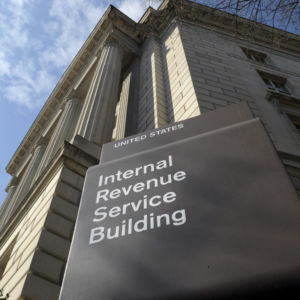“In this world, nothing is certain except death and taxes,” Benjamin Franklin said. But for the IRS, you can add a third item to the list. Scandal.
Since the agency was caught red-handed targeting tea party activists over their politics — for which the IRS has repeatedly apologized — there have been a series of stories revealing questionable behavior by the branch of government most feared by the average taxpayers.
The news isn’t good.
During the 2016 presidential campaign, the private tax documents of one candidate — Donald Trump — were leaked to The New York Times.
Last year, five current or former IRS employees were caught defrauding the Paycheck Protection Program, improperly collecting nearly half a million dollars.
“The IRS employees charged in these cases allegedly abused the trust placed in them by the public,” said Assistant Attorney General Kenneth A. Polite Jr.
But how much trust do the American people have in the IRS? And why should Americans trust it with whistleblowers currently testifying under oath that President Biden’s son Hunter received special protections that an average taxpayer would never get?
The consequences are more significant than just tax policy, said Patricia Crouse, practitioner in residence of legal studies and political science at the University of New Haven in Connecticut.
“It’s a bad look anytime one of our institutions of government does something, and most Americans respond, ‘I couldn’t get treated like that.’ And when you’re talking about the IRS in particular, people have always had trust issues because taxes hit home,” Crouse said.
And the agency’s problems extend beyond politics.
Lakepoint Land Group is a private company that recently discovered a key document in its dispute with the IRS had been backdated by the agency. The IRS then attempted to cover up its own behavior.
As reported by Politico, the IRS is facing damning accusations of backdating documents and submitting false information to the Tax Court. The IRS has gone so far as to acknowledge the falsification of records through backdating, shedding light on a larger culture of abuse and misconduct within the organization.
The controversy revolves around the IRS’s attempt to impose substantial gross misvaluation penalties on $38 million in deductions claimed by Lakepoint. According to Law360, the partnership contends the IRS deliberately backdated a crucial document required for imposing the penalties.
Lakepoint says the supervisor involved in the case backdated the document to make it appear as if it had been signed July 16, 2016, when it was actually signed February 10, 2017. The actual timeline was obfuscated further by excluding a software-generated timestamp from the supervisor’s handwritten signature. Tax Notes reports the issue came to light in February 2017 when an IRS attorney discovered that written approval for the penalties was necessary.
Lakepoint brought the IRS’s attention to the inaccurate information in the agency’s legal motions. But rather than acknowledge its questionable actions, the IRS had to be forced by a judge’s motion to compel before it handed over emails acknowledging the backdating. Those documents had been in the possession of the chief counsel attorneys for months.
“All to create the false appearance that the IRS had followed the rules imposed by Congress to protect the citizenry against IRS abuse,” said former Deputy Attorney General Rod Rosenstein, one of the attorneys representing Lakepoint.
Critics argue the Lakepoint incident contributed to a pattern of misconduct, emphasizing the pressing need for enhanced accountability.
“Once again, IRS agents are caught red-handed breaking the law. This has to stop,” said Grover Norquist with Americans for Tax Reform. “Examples like this make you wonder how often the IRS fakes evidence and doesn’t get caught. There should be no additional appropriations for the IRS until there has been top-to-bottom reform of this increasingly corrupt agency.”
The allegations come at a time of declining trust in the agency and when — paradoxically — the administration has been pushing for an $80 billion increase in funding. Of that, $45.6 billion is for increased audits of taxpayers. While the GOP clawed back $21 billion from the topline in the debt ceiling deal, IRS sources said they plan to maintain their increased enforcement budget and ask Congress for more funding.
Crouse said the days of government institutions burying their mistakes are over. “In the past, a story of the IRS mishandling documents would be in the newspaper one morning and then forgotten soon after. But in the era of social media, nothing dies, and the stories get passed around.”
Crouse said government agencies that want to regain trust must start with transparency and embrace the power of apology.
“Just be honest with the American people if something goes wrong,” Crouse added. “You’d be surprised at how far it can go if you give a sincere apology, if you just say, ‘We really screwed this up, and these are the mistakes we made, and this is the path we’re going to try to take now to avoid these mistakes happening again.’”





